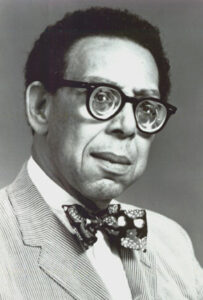 Robert Hayden
Robert Hayden
Born: August 4, 1913
Death: February 25, 1980
Place of Birth: Detroit, Michigan
Location of Death: Ann Arbor, Michigan
Burial Location: Fairview Cemetery, Ann Arbor, Michigan
Robert Hayden became at Bahá’í while studying at the University of Michigan, was an American poet, essayist, and professor who served as Consultant in Poetry to the Library of Congress from 1976–78, a role today known as US Poet Laureate. Furthermore, he was the first African-American poet to receive this honor.
Hayden was born Asa Bundy Sheffey. His parents were Ruth and Asa Sheffey, who separated before his birth, whereupon he was raised by a foster family that lived next door—Sue Ellen Westerfield and William Hayden. Hayden developed a passion for learning which was encouraged by his natural mother when they had contact. The foster family she placed him with did not share this passion and did not even understand it. The differences between these two attitudes were an additional tension in Hayden’s childhood. Eventually Ma and Pa Hayden did accept the literary yearnings of the young Robert. Later in life the failure of the Hayden’s to formally and legally adopt him also caused Robert Hayden anguish.
A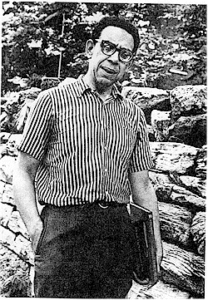 fter participating in the Federal Writers’ Project, studied under W H Auden at the University of Michigan where he won a Hopwood Award there. He and his wife Erma became attracted to the Bahá’í Faith in Ann Arbor, and Hayden became a member of the Bahá’í Faith in 1943.After teaching at Frisk for twenty-three years (1946-1969), Hayden was hired by the University of Michigan where he taught until his death from cancer in 1980.
fter participating in the Federal Writers’ Project, studied under W H Auden at the University of Michigan where he won a Hopwood Award there. He and his wife Erma became attracted to the Bahá’í Faith in Ann Arbor, and Hayden became a member of the Bahá’í Faith in 1943.After teaching at Frisk for twenty-three years (1946-1969), Hayden was hired by the University of Michigan where he taught until his death from cancer in 1980.
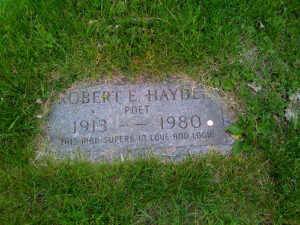 Because as a Bahá’í he advocated the Faith’s teaching of regarding the unity of humankind, Hayden could refused to embrace Black separatism that emerged so powerfully in the mid-sixties, a stand for which he received a great deal of vehement criticism from many of the African-American poets and scholars of the time. In 1966, Hayden’s collection A Ballad of Remembrance was awarded, by unanimous vote, the Grand Prize for Poetry at the first World Festival of Negro Arts in Dakar, Senegal. Hayden was elected to the American Academy of Poets in 1975. His poignant lyric “Those Winter Sundays” is among the most anthologized American poems of the 20th century.
Because as a Bahá’í he advocated the Faith’s teaching of regarding the unity of humankind, Hayden could refused to embrace Black separatism that emerged so powerfully in the mid-sixties, a stand for which he received a great deal of vehement criticism from many of the African-American poets and scholars of the time. In 1966, Hayden’s collection A Ballad of Remembrance was awarded, by unanimous vote, the Grand Prize for Poetry at the first World Festival of Negro Arts in Dakar, Senegal. Hayden was elected to the American Academy of Poets in 1975. His poignant lyric “Those Winter Sundays” is among the most anthologized American poems of the 20th century.
He accepted the position of United States Poet Laureate for 1976–1977 during America’s Bicentennial, and again in 1977–1978. He was awarded successive honorary degrees by Brown University in 1976 and Fisk in 1978 and in January of 1980, Hayden was among those gathered to be honored by President Jimmy Carter and his wife at a White House reception celebrating American poetry. He also served for a decade as poetry editor of the Bahá’í journal World Order.
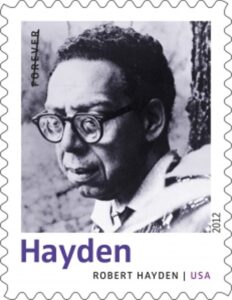 In 2012 the U.S. Postal Service issued a pane of stamps featuring ten great Twentieth Century American Poets; Robert E Hayden was among them.
In 2012 the U.S. Postal Service issued a pane of stamps featuring ten great Twentieth Century American Poets; Robert E Hayden was among them.
Source:
The Bahá’í World. “Robert Hayden: George Ronald Publisher. Volume 18, pp 715-717 Permission given by George Ronald, Publishers
Bahai-Library.com: Winters, Jonah
Images:
U.S. National Bahá’í Archives
Courtesy of Tyndareas



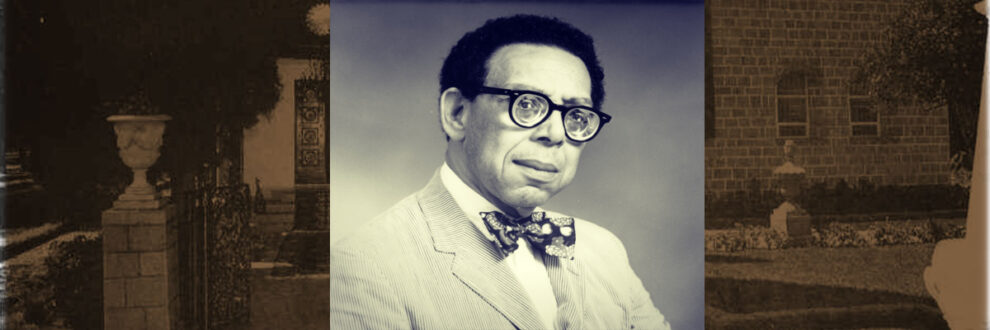

Add Comment